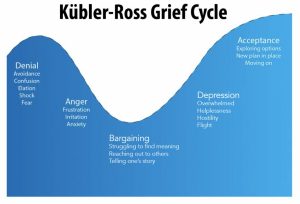2nd – 8th December 2021 is National Grief Awareness Week . The loss of somebody close can have devastating emotional, physical and practical effects, which can significantly affect an employee’s attendance and performance at work. Bereavement is a natural process that most employees will experience at some time during their working lives, so supporting a bereaved employee is something that HR and line managers need to be prepared for. It can also be challenging for colleagues and managers to know how to support grieving employees as everyone experiences grief in their own way.

Although each bereaved employee will require individual support, the Kubler-Ross grief cycle is a good starting point for understanding some of the most commonly observed stages of responding to grief. Some employees might only undergo some stages rather than all five and the stages are not linear and be revisited at any time.
Important points to take into consideration:
- Have immediate communication with the employee
But keep all conversations short and leave detailed discussions until a later date.
- Understand the employee’s entitlements to time off for bereavement
Including statutory rights to time off under Time off for Dependants & Parental Bereavement Leave. Be aware if your company offers paid leave under an enhanced policy and communicate this clearly to the employee, at an early stage, what they are entitled at least in the short term, so that they are not worrying about these things and understand where they stand
- Inform them of external support services
If you offer external support services through an employee assistance programme or group insurance, ensure that they are aware of this
- Respect their privacy
The employee may have a preference regarding what is communicated to their colleagues and clients. They may not yet have given this any thought, so it can be helpful if you ask. Some employees may not want colleagues to mention the death to them, while others may feel that it helps to talk about it. Also, how they’d like to be in contact while they’re off, for example by phone or email, and how often
- Be Flexible
Ask them what they want to do, they may need routine to begin with to be able to have some stability. Or they may want to change part of their role or workload or have a phased return. Bereavement can have a long-lasting impact and the employee may need ongoing flexibility and support.
- Consider a compassionate leave and/or bereavement leave policy if you do not already have one
A policy will set out how your business supports bereaved staff. You can also use this policy to support employees bereaved during the coronavirus (COVID-19) pandemic.
Find further advice:
